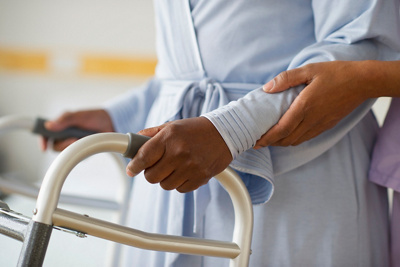A lifechanging event, a stroke can severely affect your functionality and quality of life. Yet with the correct treatment interventions and rehab, managed by an interdisciplinary team who craft an individualised plan for stroke recovery, you can recover.
Sinah shares her stroke story
When Sinah Mashifane, then 55, had a stroke in November 2022, she didn’t know what a stroke was. She primarily remembers feeling dizzy before she found herself in the hospital. “I didn’t know anyone who had a stroke before,” she says. “The doctor explained to me what it was.” During the two months she spent in hospital Mashifane began her rehabilitation programme during which she was seen by the interdisciplinary team.
She has since maintained her outpatient therapy at Rehab@Muelmed, the rehabilitation unit to which patients at Mediclinic Muelmed are referred. Suffering from communication disorder, aphasia, as a result of the stroke, Mashifane is steadily improving with the help of her speech therapist, Inge Odendaal. While some days are better than others for Mashifane, Odendaal is encouraged by her progress.
The road to stroke recovery
“Sometimes she has communication breakdowns, where she struggles to find the words or doesn’t know how to respond,” Odendaal explains. As part of her outpatient programme, Mashifane attends an aphasia support group and a stroke support group. She is also continuing with her home-based programme. For this she does daily oral reading exercises, writing exercises and a physio exercise programme.
Today almost a year after her stroke, Mashifane has gone from relying on others to regaining her independence. The fact that her everyday tasks are no longer a struggle and that she is able to do things she enjoys, is key to her quality of life.
“It was hard in the beginning but now it’s easy,” Mashifane says, speaking of returning to doing housework and doing things for herself. “I can do cleaning, cooking and washing, I’m doing everything,” she says. “I want to say thank you very much to all the therapists who helped me.”
An interdisciplinary treatment approach
At Rehab@Muelmed, an interdisciplinary team treatment approach is key to reintegrating stroke patients into their daily lives and providing optimal care. “Coordination of care is vitally important,” says Shirley Eberlein, Practice Manager for Rita Henn & Partners - Muelmed. “When you've experienced something life-changing like a stroke, we need to be able to bring all the different team members together in such a way that it's patient focused, and that there's a tailormade rehabilitation programme for that individual.”
While in a multidisciplinary team, doctors, nurses, physiotherapists, dieticians, speech therapists, occupational therapists, psychologists and social workers tend to work in their own silos, an interdisciplinary team puts the patient at the centre, coordinating with the team members and the patient's families. “There are joint goals and a shared direction in helping the patient to progress,” Eberlein explains.
This approach is taken right from the beginning, when each team member evaluates the newly admitted patient, the team comes together to set shared goals and begin discharge planning. “The person has changed significantly from who they were before the incident,” says Eberlein. “Now we have to ensure that this person is going to be able to be discharged safely and that there's a plan for what needs to be put in place by the time of discharge.”
The team looks at the person’s impairments and how they will impact their participation in daily activities – the things required for managing life, from getting dressed to going to the bathroom to walking or managing a wheelchair. “You need to prepare someone for the environment into which they'll be discharged to make the reintegration into their home and community as seamless as possible,” Eberlein explains.
This involves preparing families, putting facilities to assist the patient in place and training caregivers. Eberlein also stresses the need for ongoing post-stroke rehabilitation. “Even within the outpatient space, we need the involvement of the whole team as they progress through that journey, so they are able to reintegrate into some kind of productive activity and manage their ongoing recovery,” she adds.
Disclaimer: The information provided in this article was correct at the time of publishing. At Mediclinic we endeavour to provide our patients and readers with accurate and reliable information, which is why we continually review and update our content. However, due to the dynamic nature of clinical information and medicine, some information may from time to time become outdated prior to revision.

